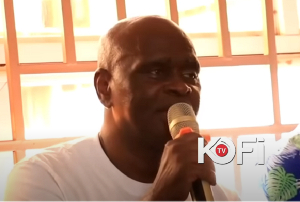- Home - News
- TWI News | TV
- Polls
- Year In Review
- News Archive
- Crime & Punishment
- Politics
- Regional
- Editorial
- Health
- Ghanaians Abroad
- Tabloid
- Africa
- Religion
- Election 2020
- Coronavirus
- News Videos | TV
- Photo Archives
- News Headlines
- Press Release
General News of Friday, 21 September 2012
Source: The Enquirer
No security at Akosombo Dam- risk management expert reveals
Dr. Anthony Karim Adams, Head of AKK Risk Management Consultancy, says Ghanaians have adopted a reactive posture in their attempts to find solution to disasters in the country.
He said, as Ghanaians “we only sit down for disaster to happen before we attempt to find solutions to them” wondering if the country was prepared to look beyond the threats that confront it today.
Dr Karim Adams said, “By then several of such incidents could have occurred, so in coming out with any ICT strategy to help us, are we proactive? Are our strategies proactive enough to look beyond the threats that we have today?”
Delivering a paper on the use of “ICT for Disaster Management, Security, Peace and Development” at the closing ceremony of the GIFEC week celebrations in Accra yesterday, Dr. Adams said it was sad there is no security presence at such a national asset, like the Akosombo Dam.
The risk management consultant stated that, “If you ever go to the Akosombo Dam, you will be sad, sad because if you are patriotic and you look at the ease with which somebody can blow off the Akosombo Dam, the next day if you were a president, you will order something to be done”.
He adds, “ Trust me, it's easy to drive through the dam to where we have the tilapia farm and it is easy to plant anything and these days you can trigger bombs using your mobile phones. Have we ever thought of the Akosombo Dam being destroyed at least for once? And how prepared are we to save the situation? These are some of the critical issues we need to look at as a nation and as people in charge of protecting us”.
According to Dr. Karim Adams, Ghana has no law on cyber crimes, and that the world was changing to the extent that the strengths of military power only cannot be sustained.
He was however sure that ICT was an unavoidable tool in fostering peace in the country.
Col. Mathew Essien, Deputy Director of Communication and Army, said the Ghana Armed Forces supports government's drive on the policy of ICT.
He said the world has moved on a reason why the Army needed to consider new trends available to defending the nation.
“The world has moved on now, we are in the information age and looking at something different-information warfare, information warfare goes beyond what I was taught in electronic warfare,” Col. Essien emphasized.
He said, “But thank God, GIFC came to our aid and I want us to appreciate GIFEC that within the past few months it has been able to establish ICT centres in all military training schools and all units across Ghana”.
While cataloging the Military's benefit from GIFEC, the Deputy Director of Communication and Information System at the Ghana Army was committed to executing its core surveillance mandate in the country.
DCOP David Asante-Apeatu, Director, IT and Research Planning of the Ghana Police Service, noted that the service had benefited tremendously from its interaction with GIFEC.
He disclosed that GIFEC has donated 3,000 mobiles phones to the service had indicated that it would be distributed to its offices at the other regions, especially as the December polls approach.
DCOP Asante-Apeatu insisted that ICT had changed the scope of its work, adding that the connection between the service and ICT must be strengthened.
He said so far GIFC has, among others, provided the Ghana Police Service with 34 sites, [computer centres] 600 desk top computers, 34, printers, 34 scanners, 31 air conditioners, while its websites is currently interactive for citizens to talk to the IGP.
ASP Charles Glegg, Head of IT at the Ghana Prisons Service, and Ms. Anastasia Bleoo-Boafo, Head of IT at the National Disaster Management Organisation (NADMO), were both grateful to GIFEC for its provision of computers and other logistics that have largely improved upon its work.
Kofi Attor, Administrator and Chief Executive Officer of the GIFEC, reiterated the need to roll out ICT education to even prison inmates.
He said it was high time everybody was offered the opportunity to be computer literate as the world moved towards ICT knowledge.
Hon. Attor explained that the move was crucial in view of ages in most of the country's prisons, reasoning the ICT could be a learning tool for their intended rehabilitation in the course of serving their respective jail terms.
GIFEC through it Security Connectivity Project, in collaboration with security agencies, has financially supported the latter to improve the quality of their services, encourage innovations in technology development and information sharing.
Beneficiary security institutions of the Security Connectivity Project include the Ghana Police Service, Ghana Army, Bureau of National Investigations (BNI), Ghana Fire Service and NADMO.
In July 2004, the government of Ghana set up the Ghana Investment fund for Telecommunication (GIFTEL) as an agency of the Ministry of Communications to facilitate the provision of universal education access to basic telephony by the unserved and underserved communities in the country.
However, the Electronic Communications Act 775 of 2008 gave the legal backing to the agency which started operations in 2005 resulting in it change of name to GIFEC.
Since then the agency has rolled out and continue to introduce a lot of life changing projects, initiates and activities among others; the Universal Access to Electronic Communications programme, the Common Telecommunications Facilities Project, which involves providing educational institutions with high speed computers and accessories while linking them to the Internet.
Entertainment










